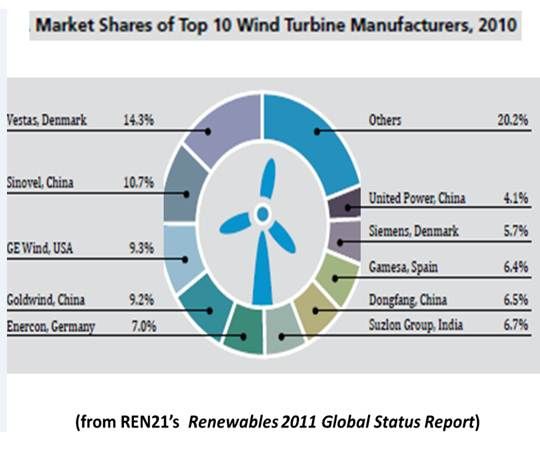American Superconductor (AMSC) has won the latest round in its $1.2 billion fight in China’s courts to protect its wind power intellectual property. A Beijing court has dismissed an attempt by Sinovel, China’s biggest wind maker, to characterize its alleged theft of AMSC IP as a contractual dispute. That means the Devens, Mass.-based company will be able to make its argument that Sinovel has stolen AMSC's technology, as it fights to survive the financial damage the imbroglio has brought about.
AMSC has also filed an appeal with China’s Supreme People’s Court on a ruling in Sinovel’s favor by a Hainan court to dismiss a similar suit. It all goes back to last summer, when an employee of the AMSC Austrian subsidiary Windtec was arrested, pled guilty and was jailed for turning over AMSC intellectual property (IP) in the form of wind turbine operating codes to Sinovel in exchange for money.
AMSC initiated an investigation after Sinovel refused delivery of AMSC wind technology it was contracted to buy. In the investigation, AMSC and Austrian police discovered emails from Sinovel executives requesting the codes and offering remuneration, emails transferring the codes, the money transfer, and evidence that the codes are in use in China in Sinovel turbines.
To recover losses and damages, AMSC is suing Sinovel in China. It is more than an effort to recoup losses that left AMSC struggling as a business. It is a test case of whether there are protections for outsiders’ intellectual property through China’s legal system.
The most recent developments in AMSC’s legal struggle are equivocal, but, because it is fighting not only for its business life but to set a precedent, the company is determined to push ahead.
“Protecting our IP and ensuring there are repercussions for those who steal intellectual property is very important,” AMSC Marketing and Communications VP Jason Fredette said. “We continue to believe the actions we’re taking are going to lead to a positive outcome.”
The intellectual property in dispute is coding that allows a wind turbine’s operating system to manage voltage and wind variability. With it, wind projects can be more readily and safely integrated into a transmission system. This capability became more widely needed in China subsequent to the government’s imposition of more demanding grid standards last year.

The company initially brought three civil cases and sought a major arbitration.
In December, in the rural province of Hainan, Sinovel convinced the court the smallest of the civil cases, for about $200,000, should be dismissed to the Beijing Arbitration Commission. AMSC has appealed that decision to China’s Supreme People’s Court.
Sinovel moved for the same dismissal in a similar Beijing civil case and was just this week denied.
If these are simple contractual disputes, the proper place for them is arbitration. By finding the civil case should not be dismissed to arbitration, the Beijing court has given AMSC’s suit greater standing and validated its fundamental contention.
“These are copyright infringement matters,” Fredette said. “Our contracts don’t contemplate copyright theft. Or IP theft.” These matters, he added “belong in the court system rather than in arbitration. For the time being, Hainan does not agree with us but Beijing does.”
AMSC’s appeal to the Supreme People’s Court will be based on that premise.
“We have trade secret matters and copyright infringement matters that we’re taking to the civil court because we don’t think there’s any recourse we could have in arbitration,” Fredette explained. The Beijing court’s decision, he added, “said this dispute does not arise from or in connection with the execution of our contracts with Sinovel.”
A Chinese source familiar with contractual dealings there, who because he continues to do business in Shanghai with Chinese wind manufacturers did not want to be named, suggested to GTM that ultimately AMSC’s mistake was in not having a contract that protected proprietary information.
Fredette did not find that plausible. “When you draft and sign contracts, you do not contemplate that the party you’re dealing with will eventually steal your intellectual property,” he said. “You can’t really write that into a contract because I think the other party would take umbrage with it.”
_540_449_80.jpg)
AMSC has also filed a third, $450 million civil suit in Beijing on the IP theft issues. The largest of the three civil cases, it has yet to begin proceedings.
In AMSC’s biggest effort to obtain satisfaction from Sinovel, it has filed on the $700-million-plus contractual dispute with the Beijing Arbitration Commission.
“There are three arbitrators, one that we select, one that Sinovel selects and one that we agree to together,” Fredette explained about what could be an international landmark arbitration case on contract law in China.
AMSC is requesting remuneration and damages “for performance of contracts that we have in place as well as payments for shipments that we’ve made to Sinovel,” Fredette said.
The arbitration, Fredette said, is not expected to include any evidence about the IP theft. “Our arbitration case is focused strictly on the contracts,” he reported. “Matters related to the theft of our intellectual property are being handled in the civil courts.”
A San Francisco attorney familiar with China’s legal system, who also requested anonymity, confided to GTM that AMSC should not expect to be made whole in the Chinese courts.
That confidence confirms a business truism and a legal truism. In business, it’s all about the deal. In lawsuits, attorneys prefer settlements, because even bad certainty is better than the risk of going before an unpredictable court.



